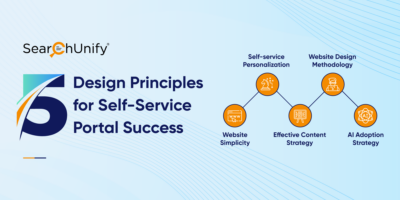
Knowledge is power. This is especially true when it comes to the support and services world. That’s why many firms have embraced KCS.
Knowledge-centered support (KCS) is a well-known concept of collecting, organizing, and using knowledge for improving customer service. Even after adopting this approach, only a handful of firms are actually able to sustain KCS.
In this blog post, we shift our focus to the Evolve loop. It helps support leaders to determine the performance of support content (KB articles etc.) and teams, all the while laying emphasis on the use of the latest technology for improvement. So, let’s take a look at five sure-fire ways to bolster the Evolve loop for a flawless KCS implementation.
1. Redefine the Way You Measure a TSE’s Contribution to Knowledge Creation
Focusing on quantity over quality would do more harm than good to your knowledge base (KB). If you measure support engineers’ performance by the number of articles they create every month, your KCS initiative is destined to fail.
This kind of ideology encourages TSEs to create more and more content without checking if the articles already exist. Also, it discourages support executives from editing and improving old articles. Both these practices contradict the fundamental principle of KCS, which is to help support representatives and customers. Hence, to succeed at KCS, reward people for publishing useful articles, not more articles.
2. Ensure Visibility of Impact of an Agent’s Contribution to the Knowledge Base
Lack of recognition by their managers is one of the top complaints of people who want to quit their jobs. If your support reps aren’t being appreciated for their contribution, they’re bound to feel that the whole process is pointless and draining.
Providing your team access to rich dashboards that keep a tally of created content and how it is performing might come in handy. Knowbler comes with a dedicated report that unveils how often the KB articles are shared and attached to support tickets. This bolsters up agent confidence in the process. Additionally, managers should check these usage statistics and appreciate top contributors over emails and weekly meetings to motivate support executives.
3. Invest in Technology That Enables You to Succeed at KCS Implementation
The primary role of support agents is handling support queries and fixing issues. They prioritize resolving as many tickets as they can. That’s why it’s hard for them to carve out time for writing new knowledge base articles. This is where the right technology can help them.
To inculcate KCS in their everyday actions, you must provide your TSEs with a comprehensive tool that makes capturing, improving, and reusing knowledge a piece of cake. Again, Knowbler uses AI to auto-populate a KB article on a predefined template as your support rep resolves the issue. All they have to do is give it a quick glance and hit the publish button. No need to open a separate platform or document the whole fix from scratch.
4. Embrace the Needed Leadership Practices and Skillset
Leadership and communication form an integral part of the evolve loop. KCS is not just a practice but a new way to think. The shift from a traditional model to a knowledge-centric model can only be realized if the management is fully onboard and strongly encourages its adoption.
According to the KCS Academy, it’s integral for leaders and managers to build the right perspective, concepts, and skills to lead a knowledge-centered organization. Hence, the management has to own KCS success and the responsibility to lead KM initiatives. Managers can start by attending events and leadership workshops organized by the KCS Academy. Also, they can employ KCS certified trainers to bring cultural change in the company.
5. Integrate Your Company Portals With KM Processes for Sustained Success
Finally, to ingrain KCS practices in the blood of support engineers, your enterprise platforms such as CRM portals should be integrated seamlessly with support tools and knowledge base.
This is of paramount importance as when multiple content repositories are integrated, your agents don’t have to leave the console or switch between platforms for information. This makes knowledge creation and sharing much easier. A cognitive search engine can make that integration a breeze. It fetches information from diverse content sources and accelerates the entire process of knowledge creation.
As you can see, knowledge creation and dissemination form the part and parcel of KCS. And if you throw in a cognitive engine, most of the kinks will be ironed out. It not only improves content findability but also imbibes KCS values into your work culture.
Want to Drive Maximum Value From Your KCS Implementation?
Download this guide to learn how cutting-edge technology can help you empower and encourage your knowledge workers to adopt KCS culture and drive maximum value from your KCS implementation.


















